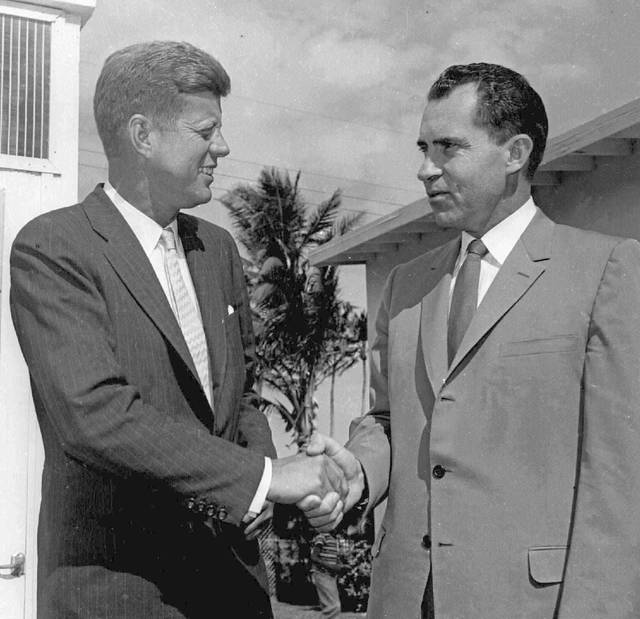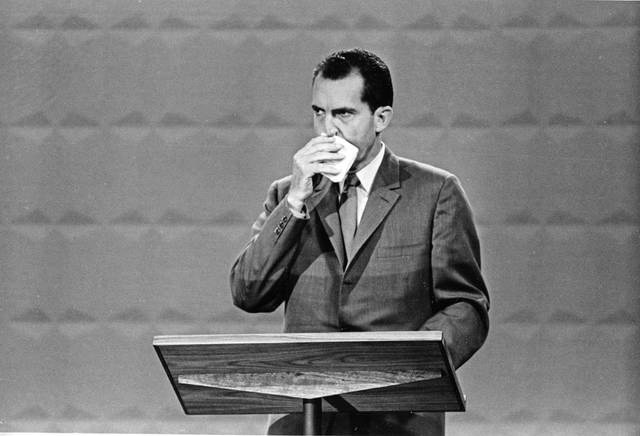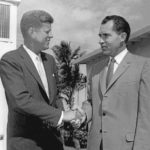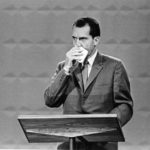When John F. Kennedy and Richard Nixon engaged in the third of their four nationally televised presidential debates on Oct. 13, 1960, Game Seven of the World Series had been played earlier that day.
Pittsburgh fans will recall the Pirates defeated the New York Yankees.
Two days before that, “The Andy Griffith Show” debuted on CBS.
And for that third debate, Kennedy and Nixon actually agreed to be in separate studios 3,000 miles apart — Kennedy in New York and Nixon in Los Angeles. (President Trump refused a similar arrangement, following his covid-19 diagnosis, for the debate once scheduled for Oct. 15.)
In 1960, a televised presidential debate, shown coast to coast, was unprecedented. During the 1950s, more and more Americans were buying TV sets. By 1960, just about everyone had one. So, it was an idea that seemed to make sense.
Jerry Shuster, a University of Pittsburgh communications professor who’s an expert in presidential rhetoric, notes it was Kennedy’s idea to stage televised debates with Nixon.
“The (Kennedy campaign) was surprised that the Nixon group agreed to the (televised) debate,” Shuster said. “Everybody was used to radio, and debates on radio had gone very well from as far back as the 1920s. But they decided that this was the way to go — using the new medium.”
Suddenly, there was a new emphasis on the candidates’ looks and presentation.
“The physical appearance of the candidates for the first time really made an impression,” said Kristen Coopie, director of pre-law at Duquesne University. “This is one of the first instances where the physical appearance and the aesthetics of a candidate really are brought to the forefront of the voter’s mind.”
When it came to style points 60 years ago, Kennedy won easily. For the first debate, on Sept. 26, 1960, he showed up tanned and wore a dark suit that contrasted sharply with the gray background of the set. Nixon had been ill and hospitalized. He showed up wearing a gray suit that blended in with the background and refused to wear makeup to hide his five o’clock shadow.
“Just the physical appearance of the two, the contrast was unreal. Kennedy was attractive and that made a huge difference,” Shuster said.
But it wasn’t just the fact Kennedy was handsome that made him successful in a televised debate.
“Kennedy had learned some skills using the medium. His movie pals gave him a lot of hints about how to play to the camera, and to focus on the camera that had the red light (the live camera),” said Shuster. “If you look at the tapes of the debate, you see how effective his eye contact was. He was talking to me when he answered questions. He wasn’t talking to Dick Nixon.”
Among those who watched the debate, Kennedy emerged the apparent winner. Many of those who listened to the debate on radio or read about it in the newspaper, however, came away with a different impression.
“People that watched the debate on television came away believing that Kennedy had won, based essentially on his performance,” said Coopie. “But if you surveyed voters who listened to the dialogue of the debate on the radio or read about it, they believed substantively that Nixon had performed better.”
The positive impression that viewers began forming of Kennedy during that first televised debate is credited with tipping the 1960 election in the Democrat’s favor. On a larger scale however, that first debate changed the way the political game is played, particularly for presidential candidates.
“It was really interesting to see the dichotomy in the reviews,” Coopie said. “This made the campaigns think that it’s not just about what you say, it’s how you say it, it’s how you look when you say it, it’s how you act when you say it.”
The public didn’t pay as much attention to the three debates that followed the first one, according to Coopie. “It’s this first one that we remember and think about,” she said.
Suddenly, television was a key component in how America picked a president.
“Television at that point is just changing the entire American culture,” said Andrew Conte, director of Point Park University’s Center for Media Innovation. “You look at what (renowned media theorist) Marshall McLuhan was talking about at that time, with the idea that ‘the medium is the message.’ His whole point was that television was becoming so ubiquitous in American households. As commonplace as it is for us today to think about that, it was really revolutionary at that time.”
As much as people were embracing television as a means for getting information and learning about the world during the 1960s and into the ’70s, televised presidential debates disappeared as quickly as they had come onto the scene 60 years ago. None were held between 1960 and 1976, when President Gerald Ford and Democratic challenger Jimmy Carter engaged in a series of them.
So, why weren’t any debates held for 16 years?
“I think the success of Kennedy and the failure, on TV, of Nixon allowed the prevailing attitude to be ‘I’m not getting on that,’ ” said Shuster. “Think who the candidates were during that period of time — Lyndon Johnson, Barry Goldwater, Hubert Humphrey, George McGovern. Would you go up against some of them, if you didn’t have the finesse and the skill to debate on that medium?”
The campaigns though soon realized televised debates had to be done whether the candidates liked them or not.
By the mid-1970s, “they finally concluded that television has become such a part of our culture and our lives that we have to do it on TV,” said Shuster.
Televised debates have been held between presidential candidates every four years for the last 44 years and Americans likely can’t imagine a presidential race without them. But in the age of social media, do debates still matter as a serious venue to help voters decide? The first debate between Trump and Biden, on Sept. 29, was regarded as a failure for being a shouting match.
“There is an erosion of political civility, not only on a debate stage but, as we’re seeing, across the country in public and in the electorate as well,” said Coopie. “But the public likes to see candidates. That’s one of the benefits of the internet and streaming services and Twitter, having access to what the candidates have to say. So, what better way to do so than to put the two candidates on the stage and let them have an exchange of ideas and see how they act under pressure?”
Conte said televised presidential debates remain hugely relevant because of the American public’s need to size up the candidates.
“People want to see, if only for a few minutes, how the candidates look in comparison to each other, how they interact with each other, how they hold up against that kind of pressure,” he said. “Think about 2016. One of the images people remember is how Donald Trump walked around behind Hillary Clinton in what some people perceived as a threatening or menacing way.
“That visual spectacle remains a critical touchstone for presidential races and it will continue to be that way until the next iteration of the debates with probably more of an interactive, social media type vibe to them, particularly when we start getting candidates who are younger. Then I think we’ll see the debate format evolve again.”











